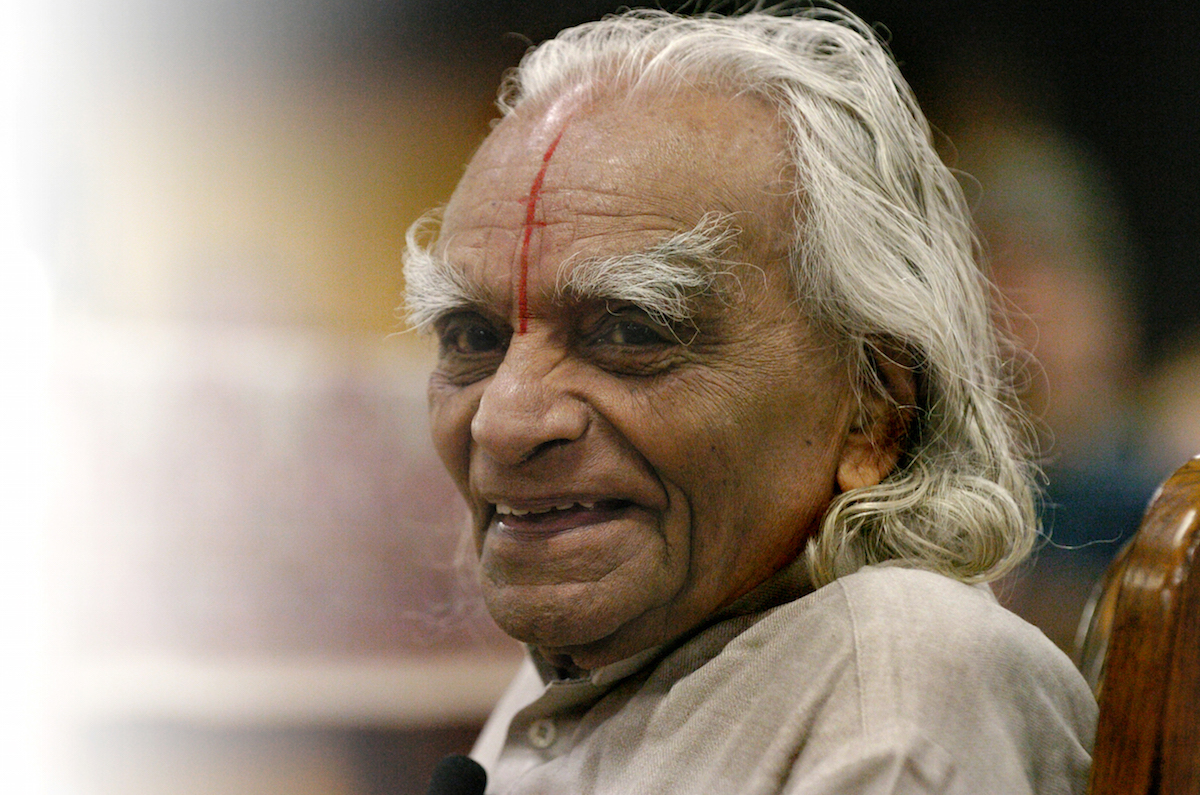BKS Iyengar paying homage to Sage Patanjali
Geeta, Prashant and Abhijata Iyengar
Iyengar Yoga
Iyengar Yoga is so called because an extraordinary man called Bellur Krishnamachar Sundararaja Iyengar (14 December 1918 – 20 August 2014) dedicated his life to the study and practice of yoga. He never referred to it as “Iyengar Yoga” but as his students (directly or indirectly) we identify ourselves as being part of the community of practitioners whose practice is led by his profound and wide reaching insight.
B.K.S. Iyengar was born on December 14, 1918, in Bellur, India, he studied and practised yoga continuously for over 85 years.
Having taught for many decades in all five continents, B.K.S. Iyengar won worldwide respect and recognition for his achievements and made yoga accessible and relevant to people everywhere, no matter what their physical or mental ability. He set the standard for his teachers and students and his books on yoga have become classics.
Triumphing over poverty and serious childhood illness, B. K. S. Iyengar began his study of yoga at a young age with his guru, T. Krishnamacharya. Practicing hour after hour, year after year, he acquired the encyclopedic knowledge which fired his teaching.
what distinguishes “iyengar yoga’ from other disciplines?
In Iyengar Yoga we practice the eightfold path (ashtanga yoga) as outlined by Sage Patanjali in the Yoga Sutras. We have a particular focus on the third and the fourth limbs of ashtanga yoga: asana (iconic postures of, for and through the body) and pranayama (ways to investigate and regulate the breath in the body).
Beginners are introduced first to how to make the body shapes in asana. And the teaching of asana is introduced methodically and progressively.
The training of Iyengar teachers is highly structured and consistent across the world. Unlike many schools of yoga one can only embark on the journey of becoming an Iyengar teacher once a firm practice has been established (over a minimum of three years). All Iyengar teachers will then undergo a systematic period of training and assessment - which will also take between 2-3 years.
For this reason Iyengar Yoga is often regarded as a particularly safe method of training in asana.
The three hallmarks of the practice of Iyengar Yoga are technique, timing and sequencing.
B.K.S. Iyengar is often quoted as saying “Alignment is Enlightenment” and Iyengar classes frequently - and in various ways - investigate how we can align the body to create maximum length, breadth or rotation. This is part of the technique you might encounter in an Iyengar class. Those coming to Iyengar from other disciplines are often amazed (and delighted) by the precision with which we work, and ask our students to work.
Technique also refers to the way in which we use props (frequently invented by B.K.S. Iyengar himself) to support the body and investigate the refinements of alignment. Props also may be used to help those who might otherwise be unable to practice.
Iyengar Yoga is characterised by sometimes remaining for some time in postures that, in other schools of yoga, one might move in and out of quite quickly. This demands technique and skill, and is also one of the reasons props are used - so that a duration in an otherwise arduous posture becomes a real pleasure.
In Iyengar Yoga one seldom practices the same sequence repetitively. All classes are different. And the order in which postures are sequenced is explored - we find different consequences from - for instance - doing back bends before or after twists. The effects of different sequences are subtle yet tangible, and skilled practitioners will use their knowledge and experience creatively to find sequences appropriate to changing seasons, circumstances, intentions and students.
The Ramamani Iyengar Memorial Institute (RIMYI)
The Ramamani Iyengar Memorial Institute (RIMYI) is located in Pune, Maharashtra, India. The institute was established on January 19, 1975 and is dedicated to Smt. Ramamani Iyengar, the wife of B.K.S. Iyengar. Its directors are Prashant S. Iyengar (BKS Iyengar’s son) and Abhijata Iyengar (BKS Iyengar’s grandaughter). Students from all over the world visit the institute every year.
The institute in Pune also regulates how teachers are trained and what the expectations are of those who choose to call themselves teachers of Iyengar Yoga. This is to ensure safety of the students, consistency across the world, and to honour the lineage within which we’re working.
"Change is not something that we should fear. Rather, it is something that we should welcome. For without change, nothing in this world would ever grow or blossom, and no one in this world would ever move forward to become the person they're meant to be.”
B K S Iyengar



